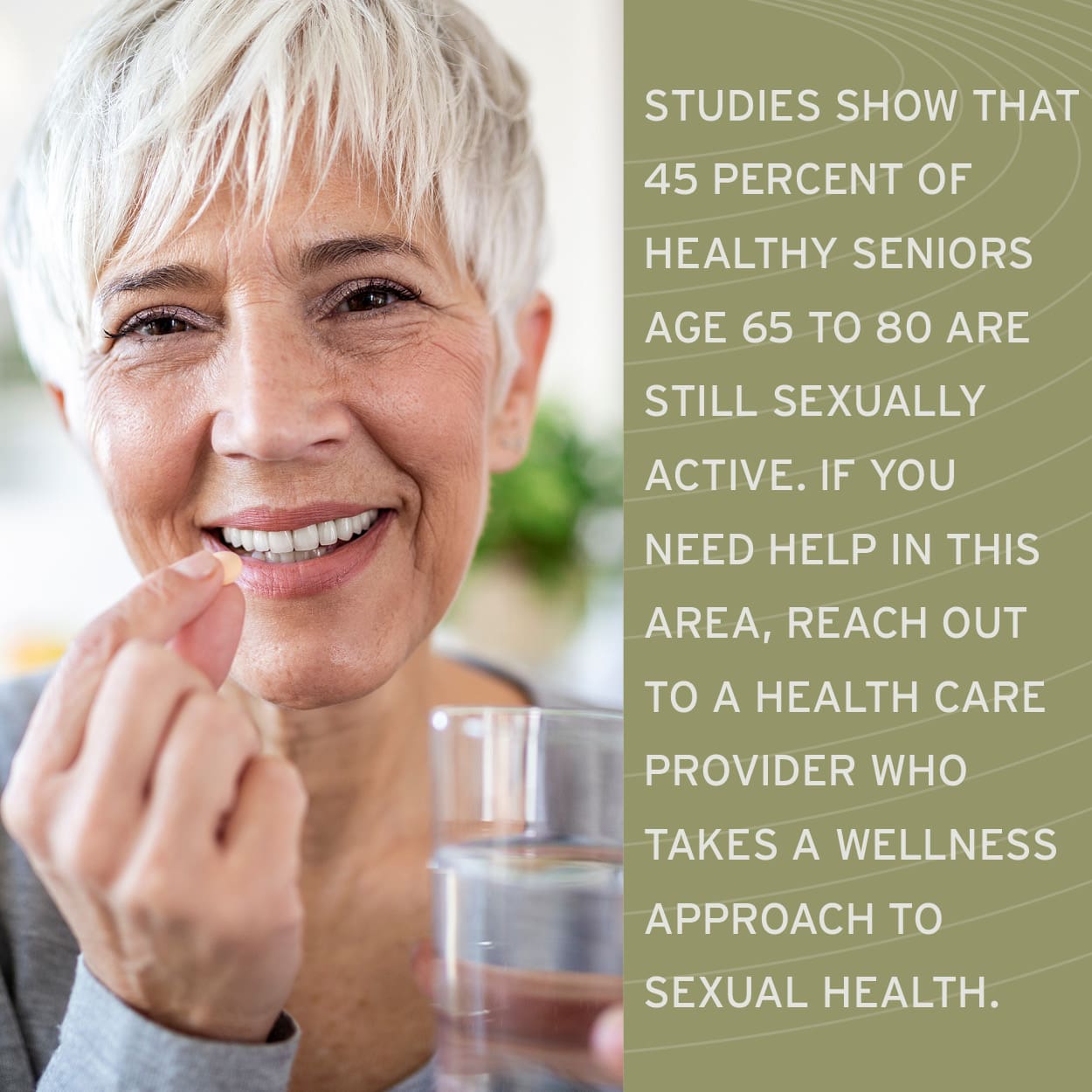
By Cynthia McFarland
Intimacy Still Matters in the Golden Years

Sexual intimacy is about more than physical satisfaction – especially in relationships that have spanned decades.
Many long-time partners say the emotional, mental and spiritual connection is as impactful as the physical aspect.
That’s a good thing since our bodies change as we age and some of the most frustrating changes can be sexual. Intimacy that was once effortless becomes challenging. Things just don’t “work” as they once did.
Erectile dysfunction, vaginal dryness, bladder leakage, negative body image and mental health can all play havoc with your sex life as you age.
There are plenty of misconceptions about sexual health and aging, such as:
- Older men can’t achieve and sustain fulfilling erections
- Older women aren’t interested in sex
- Sexual activity can be dangerous for older adults
- Sexually transmitted diseases aren’t an issue
Fortunately, technology and modern medical treatments are on your side. You can take control of your sexual health with key lifestyle changes and the latest medical advances.

Different approach
“Most traditional doctors will say that sexual pleasure declines and you can’t help how your body changes sexually with age. Don’t believe the myths,” says Amanda Gaskin, APRN, of Ultimate Health Direct Primary Care (www.ultimatehealthdpc.com) in Leesburg.
When Amanda founded her practice, she was personally familiar with the sexual frustration of physical changes, having had a hysterectomy at 35. Today, she treats patients age 30 to 80 for sexual health concerns.
She specializes in seniors, assuring them that sexual concerns can be treated with an entire toolbox that includes:
- Hormone therapy
- Alternative and natural treatments
- Lifestyle changes
- Mental health
Hormones
Any time a patient comes in with sexual problems, the first step is bloodwork to check their hormone levels.
“When we’re young and getting ourselves in trouble, it’s because our hormones are optimized,” Amanda says.
Optimizing those hormones in the golden years can help solve many sexual problems.
For instance, raising testosterone levels through hormone therapy can help erections last longer and be stronger in men over age 50 who typically experience some erectile dysfunction (ED) due to a natural decline in testosterone.
Women also benefit from testosterone. In addition to sexual wellness, it promotes heart and bone health.
When a woman has physical changes “downstairs,” hormone therapy may be the solution. Estrogen and progesterone therapy can address dryness, vaginal atrophy and frequent urinary tract infections caused by the decrease in those hormones due to aging.
“We used to use progestin, but we don’t use that anymore, so even women with a family history of breast cancer are candidates for hormone use. Hormones can even help prevent breast cancer,” Amanda says. “There’s no age or time limit to getting hormones. As long as you want to enjoy the benefits, you can continue to use them.”
Hormones can be administered via creams, injections or subcutaneous pellets for sustained release over several months.
Natural and Alternative Options
Advances in technology offer unique options for those who are mentally and emotionally invested in sex but dealing with physical changes.
The O-Shot® (Orgasm Shot®) utilizes platelet-rich plasma (PRP) from the patient’s own blood to increase blood flow and rejuvenate vaginal tissue and nerve endings.
Men can benefit from the “P-Shot” (Priapus Shot®), which uses PRP to help with ED by improving blood flow.
Both procedures are FDA-cleared.
ED can also be treated with ultrasound wave therapy and medication.
Vaginal moisturizers with natural ingredients and water-based lubricants can also make sexual activity more comfortable for women.

Lifestyle
If you’re unhappy with your body image, removing your clothes for sex can be intimidating.
You don’t have to look like a model in your golden years, but a sensible exercise and eating plan will help you feel comfortable in your “adult” body.
If you need help with weight management, there are currently a variety of options, including GLP-1 medications and non-prescription, plant-based supplements for appetite control.
Mental
Studies show nearly 3-in-10 adults have been clinically diagnosed with depression at some point. Seeking professional help through therapy and medication can be a game changer to improving mental health.
Unfortunately, many antidepressants affect both libido and sexual function. Amanda finds depression can usually be managed with treatment that doesn’t cause negative sexual side effects. If depression is an issue, you’ll want to work with a provider who is knowledgeable in this area.
Prescription for trouble
Medications for blood pressure, depression and other conditions can cause problems with sexual intimacy. Review necessary medications with your health care provider. You may be able to change to a drug that doesn’t have those side effects.
Photos: Supplied
"I fell in love with words early on and knew from fourth grade that I wanted to be a writer,” says Cynthia McFarland. A full-time freelancer since 1993 and the author of nine non-fiction books, her writing has earned regional and national awards. Cynthia lives on a small farm north of Ocala; her kids have fur and four legs







